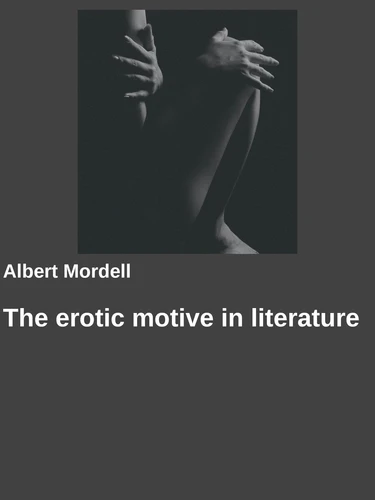The erotic motive in literature
Par : ,Formats :
Disponible dans votre compte client Decitre ou Furet du Nord dès validation de votre commande. Le format ePub protégé est :
- Compatible avec une lecture sur My Vivlio (smartphone, tablette, ordinateur)
- Compatible avec une lecture sur liseuses Vivlio
- Pour les liseuses autres que Vivlio, vous devez utiliser le logiciel Adobe Digital Edition. Non compatible avec la lecture sur les liseuses Kindle, Remarkable et Sony
- Non compatible avec un achat hors France métropolitaine
 , qui est-ce ?
, qui est-ce ?Notre partenaire de plateforme de lecture numérique où vous retrouverez l'ensemble de vos ebooks gratuitement
Pour en savoir plus sur nos ebooks, consultez notre aide en ligne ici
- Nombre de pages280
- FormatePub
- ISBN978-3-7519-1770-4
- EAN9783751917704
- Date de parution07/05/2020
- Protection num.Adobe DRM
- Taille839 Ko
- Infos supplémentairesepub
- ÉditeurBooks on Demand
Résumé
Special service after purchase:
For the booking of an exclusive round of discussions/reading with the publisher, questions, wishes or suggestions write an email to books.gabrielarch [at] t-online.de
The work The erotic motive in literature uses some methods of psychoanalysis to literature. Albert Mordell tried to show that unsuspected emotions of the writer have entered into his literary productions, that events he had apparently forgotten have guided his pen.
The unconscious is largely identical with the mental love fantasies in our present and past life. Since the terms "unconscious" and "erotic" are almost synonymous, any serious study of literature which is concerned with the unconscious must deal impartially with eroticism. One may deduce what kind of literary work would have been the result if one have not only the hereditary antecedents and biographical data of an author, but a full account of his day dreams, ambitions, frailties, disillusionments, of his favourite reading, intellectual influences, love affairs and relations to his parents, relatives and friends. Literature is a personal voice the source of which can be traced to the unconscious. In chapter 8.2 psychoanalysis explains the birth of literary masterpieces.
The effects of sadism and masochism on the literary work of a man in later life are shown in chapter 10.3. One gets a few symbolic interpretations of dreams in literature in chapter 11.3.
The unconscious is largely identical with the mental love fantasies in our present and past life. Since the terms "unconscious" and "erotic" are almost synonymous, any serious study of literature which is concerned with the unconscious must deal impartially with eroticism. One may deduce what kind of literary work would have been the result if one have not only the hereditary antecedents and biographical data of an author, but a full account of his day dreams, ambitions, frailties, disillusionments, of his favourite reading, intellectual influences, love affairs and relations to his parents, relatives and friends. Literature is a personal voice the source of which can be traced to the unconscious. In chapter 8.2 psychoanalysis explains the birth of literary masterpieces.
The effects of sadism and masochism on the literary work of a man in later life are shown in chapter 10.3. One gets a few symbolic interpretations of dreams in literature in chapter 11.3.
Special service after purchase:
For the booking of an exclusive round of discussions/reading with the publisher, questions, wishes or suggestions write an email to books.gabrielarch [at] t-online.de
The work The erotic motive in literature uses some methods of psychoanalysis to literature. Albert Mordell tried to show that unsuspected emotions of the writer have entered into his literary productions, that events he had apparently forgotten have guided his pen.
The unconscious is largely identical with the mental love fantasies in our present and past life. Since the terms "unconscious" and "erotic" are almost synonymous, any serious study of literature which is concerned with the unconscious must deal impartially with eroticism. One may deduce what kind of literary work would have been the result if one have not only the hereditary antecedents and biographical data of an author, but a full account of his day dreams, ambitions, frailties, disillusionments, of his favourite reading, intellectual influences, love affairs and relations to his parents, relatives and friends. Literature is a personal voice the source of which can be traced to the unconscious. In chapter 8.2 psychoanalysis explains the birth of literary masterpieces.
The effects of sadism and masochism on the literary work of a man in later life are shown in chapter 10.3. One gets a few symbolic interpretations of dreams in literature in chapter 11.3.
The unconscious is largely identical with the mental love fantasies in our present and past life. Since the terms "unconscious" and "erotic" are almost synonymous, any serious study of literature which is concerned with the unconscious must deal impartially with eroticism. One may deduce what kind of literary work would have been the result if one have not only the hereditary antecedents and biographical data of an author, but a full account of his day dreams, ambitions, frailties, disillusionments, of his favourite reading, intellectual influences, love affairs and relations to his parents, relatives and friends. Literature is a personal voice the source of which can be traced to the unconscious. In chapter 8.2 psychoanalysis explains the birth of literary masterpieces.
The effects of sadism and masochism on the literary work of a man in later life are shown in chapter 10.3. One gets a few symbolic interpretations of dreams in literature in chapter 11.3.



